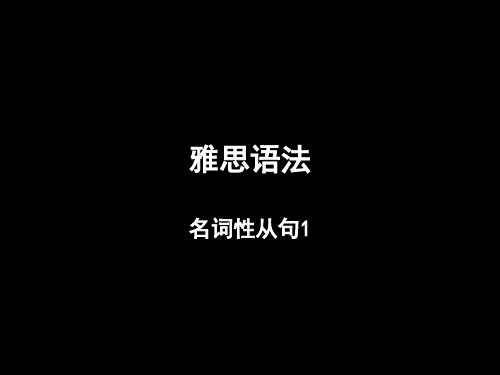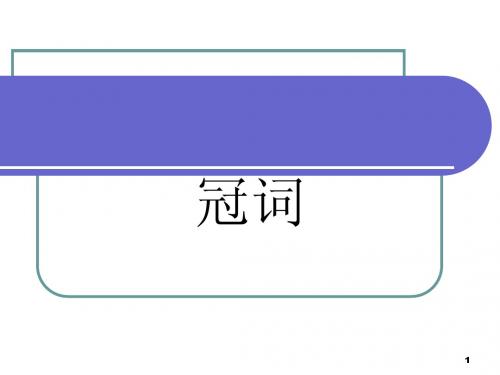语法-3
- 格式:ppt
- 大小:948.00 KB
- 文档页数:37



语法专题专题三代词I、重点难点解析代词是代替名词的一种词类。
大多数代词具有名词和形容词的功能。
英语中的代词,按其意义、特征及在句中下面举例说明,其中疑问代词见“句子种类”,关系代词见“定语从句”。
一人称代词的用法1 作主语,用主格。
作宾语用宾格。
She teaches us English.2 在句中作表语,常用宾格。
Who is it? It’s me. 但有时用主格。
If I were she, I would’t go there.It was I who told him about it.二物主代词的用法1.形容词性物主代词——只作定语:This is our classroom. His father is an engineer.2说明:①英语中必须有形容词性物主代词,而汉语中往往省略不译。
如:Jack took off his coat and went to bed.杰克脱掉外套就上床睡觉了。
② “of + 名词性物主代词”可用作定语。
如:Some friends of mine will attend my birthday party.我的一些朋友要出席我的生日晚宴。
四指示代词的用法1.时空的差别e.g. There is this seat here, near me, or there is that one in the fourth row. Which will you have, this or that?2. This 和that 在行文叙述上的差别。
E.g.I shall say this to you: he is a poor man. He was ill. That’s why he didn’t come.3.that 和those 用于表比较的结构。
The weather of Zhanjiang is better than that of my hometown. TV sets made in Nanjing are better than those made here.4. 打电话时this 表示我,that表示你.五不定代词的用法1.none, no one, nothing 的用法区别1)none 既可指人,也可指物,且一定是特指概念,常用来回答how many /much 引导的疑问句;no one 只能指人,且只能是泛指概念,常用来回答who 引导的疑问句;nothing “什么也没有”,否定一切,常用来回答what 引导的疑问句。

虚拟条件句的基本类型与结构一、与现在事实相反若与现在事实相反,虚拟语气的条件从句的谓语用过去式(be通常用were),主句谓语用“should (would, could, might)+动词原形”。
如:If you took a taxi,you'd get there quicker. 如果你坐出租车去,你可以快一点到那里。
(但你不坐)If I knew her number I could ring her up. 要是我知道她的电话号码,我就可以给她打电话了。
(可惜我不知道)二、与过去事实相反若与过去事实相反,虚拟语气的条件从句的谓语用过去完成时(had+过去分词),主句谓语用“should (would, could, might)+have+过去分词”。
如:If I'd left sooner,I'd have been on time. 要是我早点动身,我就准时到了。
(但我动身太迟了)If we had found him earlier we could have saved his life. 要是我们当时早点找到他的话,我们就可以救活他。
(可惜我们找到他太晚了)三、与将来事实相反若与将来事实相反,条件从句的谓语用过去式(be通常用were),主句谓语用“should (w ould, could, might)+动词原形”。
如:If he went,would you go too? 如果他去,你也去吗?(大概他不会去)If I asked him,I'm sure he'd help us. 如果我向他提出要求,肯定他会帮助我们。
(不过我不打算这样做)注意与说明:对于与将来事实相反的情形,请注意以下几点:一是这里说的与将来事实相反,实为对将来情况的推测;二是此用法中的条件从句谓语除用过去式外,有时也用“should+动词原形”(表示可能性极小,常译为“万一”)或“were to+动词原形”(表示与将来事实相反的假设);三是当条件从句使用“should+动词原形”这样的谓语时,主句谓语除可用“should (w ould, could, might)+动词原形”这样的虚拟语气外,也可用陈述语气或祈使语气。


第三集语法填空核心考点考点突破——形容词和副词——使表达更准确生动【考向聚焦】往年考查的重点是形容词和副词的比较级和最高级的用法。
近三年来考点开始涉及多个形容词作前置定语的排列顺序、形容词及形容词短语作状语,形容词和副词的词义比较和具体运用。
要复习好这一块的知识,考生不仅要弄清其词形、词义、功能等基础知识,还要掌握同义词辨析和一词多义等重点知识。
对应学生用书P9用适当的形容词或副词填空1.(2013?福建,31)Those poor and needy teenagers were excited to find a shop at the corner where they could buy ________(afford)priced bikes.解析根据 Those poor and needy teenagers(那些贫穷的青少年)可知,那个商店定价不太昂贵。
答案affordably2.(2013?安徽, 33)It's said that the power plant is now________(twice)large as what it was.解析考查比较级倍数表达句型。
句型为:倍数+ as+形容词、副词原级+ as+比较对象。
答案twice as3 . (2013? 湖北, 29)Don't defend him any more.It's obvious thathe________(deliberate)destroyed the fence of the garden even without apology.解析句意:不要再坦护他了。
他显然是故意破坏花园栅栏的,而且没有道歉,此处应用副词形式。
答案deliberately4.(2013?江西,24)What a terrible experience!________,you're safe now—that's the main thing.解析考查副词。
现在进行时表示将来(一)现在进行时表示将来,主要用于表示按计划或安排要发生的动作。
常有“意图”“安排”或“打算”的含义。
这种现在进行时比较生动,给人一种期待感。
它常表最近或较近的将来,所用动词多是转移动词。
表将来的现在进行时除用于转移动词表示外,亦可用于某些非转移动词。
转义动词即表示移动的动词,如come go,可以在句式be verb-ing to 中表示打算,实现将来时。
能这样用的动词还有arrive, do, get, have, leave, meet, play, return, see, spend, start, stay, wear, work 等。
如:They’re getting married next month. 他们下个月结婚。
Are you meeting Bill this evening? 你今晚将和比尔见面吗?1) come, go, stay, arrive, leave 等词的现在进行时经常用来表示将来确切的计划。
I’m leaving tomorrow. 我明天走。
2) 表示交通方式、行程安排的动词,例如 fly,walk, ride, drive, take(a bus, a taxi)等的现在进行时也经常用于表示将来。
但偶尔也表示较远的将来。
如:When I grow up, I’m joining the army. 我长大了要参军。
3)表将来的现在进行时有时含有“决心”的意思,多用在否定结构中。
如: I’m not going. 我不走了。
I’m not waiting any longer. 我不再等了。
有时也用在肯定结构中。
如:I’m backing out. 我要打退堂鼓了。
4)用这种现在进行时与对方讲话时可变成命令,不过语气比较温和。
如:You are staying. 你留下吧。
Don’t forget: you are taking part too. 不要忘记:你也要参加。
第三章形容词和副词形容词用来修饰、说明名词或不定代词,表示人或物的性质、特征和状态。
而副词是用来修饰动词、形容词、其他副词或整个句子,有时也能修饰名词,表示时间、地点、方式、程度等。
何时用形容词何时用副词是许多同学搞不清楚的地方。
一些常见形容词、副词的区别也是高考的一个重点。
第1讲形容词和副词的选用考点1.根据所作的句子成分选用形容词和副词修饰动词、形容词、副词或整个句子用副词,这时,副词作状语;作定语、表语和补语时一般用形容词。
可简单归结为:形作“定表补”;副修“副句形动”(可谐音记为“付诸行动”),常做状语。
常见的使用形容词的情况:作表语、定语、补语。
He is a careful boy.(作定语,用形容词)He is careful.(作表语,用形容词)You must keep your eyes closed. (作宾语补足语,用形容词)。
常见的使用副词的情况:修饰动词、形容词、副词和整个句子。
He writes carefully. He walks slowly.(认真地写,慢慢地走,修饰动词用副词)This material is environmentally friendly.(修饰形容词用副词)He runs very slowly.(修饰副词slowly, 因此very是副词)Unfortunately, he lost all of his money.(修饰整个句子用副词)Ⅰ. 用括号内词的形容词或副词形式的适当形式填空, 并说明为什么用这种形式。
1.This math problem is _____ and I can work it out_____.(easy)2.There was a _____ wind last night, it blew_____.(strong)3.The boys have a _____ time, they’re playing_____.(happy)4.The_____ girl sings very _____. (beautiful)5.“I’ve missed it,” Robert said _____. (angry)6._____(surprising), he returned safe and sound (安然无恙地) the next morning.7._____ (hope), he can get on well with all hisclassmates in the new school.8._____, he didn’t fail in the exam.(luck)9.He was _____ ill and I was _____ sorry for that.(terrible)10.It was _____ (extreme) cold that day and themeeting was _____ (especial) important.11.He is an _____ singer and he sings _____ well.(incredible)Ⅱ. 选择括号内的形容词或副词填空。